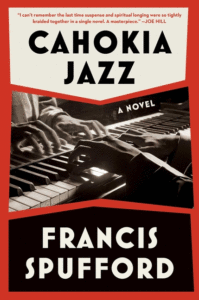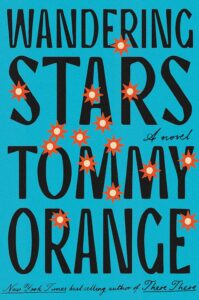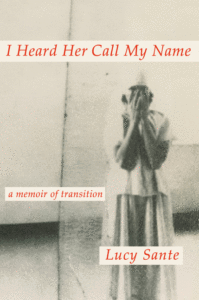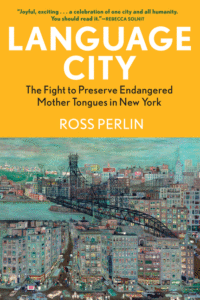
Leslie Jamison’s Splinters, Tommy Orange’s Wandering Stars, Sloane Crosley’s Grief is For People, and Francis Spufford’s Cahokia Jazz all feature among February’s Best Reviewed Books.

1. Cahokia Jazz by Francis Spufford
(Scribner)
14 Rave • 1 Positive • 2 Mixed
“One of the signal achievements of this exceptional novel is the generosity and rigour with which it conjures up Cahokia. Spufford’s creation absolutely feels like a place you could visit, or could have visited, if you happened to be travelling westward across the United States in the year of modernism, 1922. Spufford has imagined a history, a culture, a full suite of territorial and ethnic tensions; he even knows when and where the Cahokian trains run. And every detail is pertinent to his beautifully buttoned-up plot. And there is no clumsy expository dialogue.”
–Kevin Power (The Irish Times)

2. Ordinary Human Failings by Megan Nolan
(Little Brown and Company)
10 Rave • 2 Positive • 2 Mixed
“Nolan begins by embracing the genre’s major tropes (dead child, plucky journalist, family secrets) only to turn their governing logics against them with prosecutorial persistence and precision. This is a murder mystery in which there is little mystery about the murder, a page-turner in which the suspense hinges less on what happened than on how and why certain people become the people to whom such things happen … Nolan’s prose is clean and exacting, with an almost clinical interest in the power of shame: class shame, sexual shame, national shame, the shame of the addict. It seems to rank high among Nolan’s writerly principles that the cure for shame is honesty, however ugly the truth is … Nolan’s vision is grim but not hopeless, unflinching yet uncynical.”
–Justin Taylor (The Washington Post)

3. Wandering Stars by Tommy Orange
(Knopf)
10 Rave • 3 Positive • 1 Pan
Read an excerpt from Wandering Stars here
“An eloquent indictment of the devastating long-term effects of the massacre, dislocation and forced assimilation of Native Americans, it is also a heartfelt paean to the importance of family and of ancestors’ stories in recovering a sense of belonging and identity … A somewhat manic polyphonic construction that deploys first, second, and third person narration in its determination to capture the perspectives of its varied cast … Orange has a predilection for repeating words that concern endurance and survival, which results in incantatory phrases that loop and curl in on themselves, as does his narrative. His language soars … More than fulfills the promise of There There.”
–Heller McAlpin (NPR)
4. The Book of Love by Kelly Link
(Random House)
7 Rave • 4 Positive • 4 Mixed
Read a craft essay by Kelly Link here
“Long, but never boring … Reviewing The Book of Love feels like trying to describe a dream. It’s profoundly beautiful, provokes intense emotion, offers up what feel like rooted, incontrovertible truths — but as soon as one tries to repeat them, all that’s left are shapes and textures, the faint outlines of shifting terrain … So much of Link’s work steps lightly, a tempering of the commonplace with vivid, delicate surprise … Its composition, its copiousness, suggests that love, in the end, contains all — that frustration, rage, vulnerability, loss and grief are love’s constituent parts, bound by and into it.”
–Amal El-Mohtar (The New York Times)
5. In Ascension by Martin MacInnes
(Grove Press/Black Cat)
7 Rave • 3 Positive
Read an interview with Martin MacInnes here
“An elegiac voyage through these questions, a vaulting exploration of the interplay between the micro and the macro, the human and the otherworldly … Leigh’s connection to, and reverence for, the natural world is profoundly moving. MacInnes’s descriptions are lush, almost devotional at times.”
–Sophie Mackintosh (The New York Times Book Review)
**
1. Grief is for People by Sloane Crosley
(MCD)
11 Rave • 1 Positive
“If Crosley’s descriptions of love for Russell are often dazzling and unexpected, her meditations on grief are occasionally clichéd. But bromides are par for the course when it comes to bereavement, and this, too, is part of the indignity of loss … Grief may follow a familiar path in every instance, but Russell himself was fiercely original, and Crosley paints a vivid and moving portrait of a singularity … Not a philosophical meditation on grief but an honest account of its cruelties and contradictions. It contains no lessons, no morals and no solutions. It is not didactic. It is as messy, rollicking and chaotic as life isnot a philosophical meditation on grief but an honest account of its cruelties and contradictions. It contains no lessons, no morals and no solutions. It is not didactic. It is as messy, rollicking and chaotic as life is … Crosley holds Russell in her heart with humor and humanity, and although she emphasizes that writing is not a consolation or an act of therapy, it is nonetheless a testament.”
–Becca Rothfeld (The Washington Post)
2. Splinters by Leslie Jamison
(Little Brown and Company)
7 Rave • 5 Positive • 2 Mixed
Listen to an interview with Leslie Jamison here
“This one is slimmer, less digressive, more focused on Jamison’s singular experience [than The Recovering]. But it, like its predecessor, makes a particular life ramify more broadly in intriguing and poignant ways … About the bewildering nature of new motherhood, the implosion of Jamison’s marriage, parenting solo, dating as a single mother, coping with illness and lockdown. But it is also about storytelling … Though this well of grief and guilt is not dramatized, it is not unglimpsed. Jamison writes around the hole in her story, and we can feel the gravity of its pull in her presentation of herself … Her ferocious honesty, her stringent refusal to sugarcoat, her insistence on inhabiting and depicting moments in all their evanescence and incandescence make her one of the most compelling and trustworthy memoirists we have.”
–Priscilla Gilman (The Boston Globe)

3. I Heard Her Call My Name by Lucy Sante
(Penguin Press)
7 Rave • 2 Positive
Read an excerpt from I Heard Her Call My Name, here
“Her memoir is moving for many reasons, but primarily for its observations about aging and vanity, as seen through the separated colors of a prismatic lens … Vividly written … One of the things that make this memoir convincing is that it is, on a certain level, unconvincing. Sante is a writer with a lot of peripheral vision … It’s a story worth following, to watch her ring the bells that will still ring. Her sharpness and sanity, moodiness and skepticism are the appeal.”
–Dwight Garner (The New York Times)
4. Slow Noodles: A Cambodian Memoir of Love, Loss, and Family Recipes by Chantha Nguon with Kim Green
(Algonquin)
5 Rave • 4 Positive
“Brutal though ultimately hopeful … The book is not only an impactful memoir of an extraordinary woman but a human-centered take on an era that has largely been defined by a lack of humanity.”
–Soleil Ho (The San Francisco Chronicle)

5. Language City: The Fight to Preserve Endangered Mother Tongues in New York by Ross Perlin
(Atlantic Monthly Press)
4 Rave • 4 Positive
“Panoramic, enthralling … Perlin’s discussion of indigenous languages is stellar … Perlin also weaves in his own story; his grandfather, who died in 1997, was the last Yiddish speaker in his own extended lineages. He probes the poignancy and complexity of his own feelings, lending a candor and tenderness to his account.”
–Hamilton Cain (On the Seawall)

